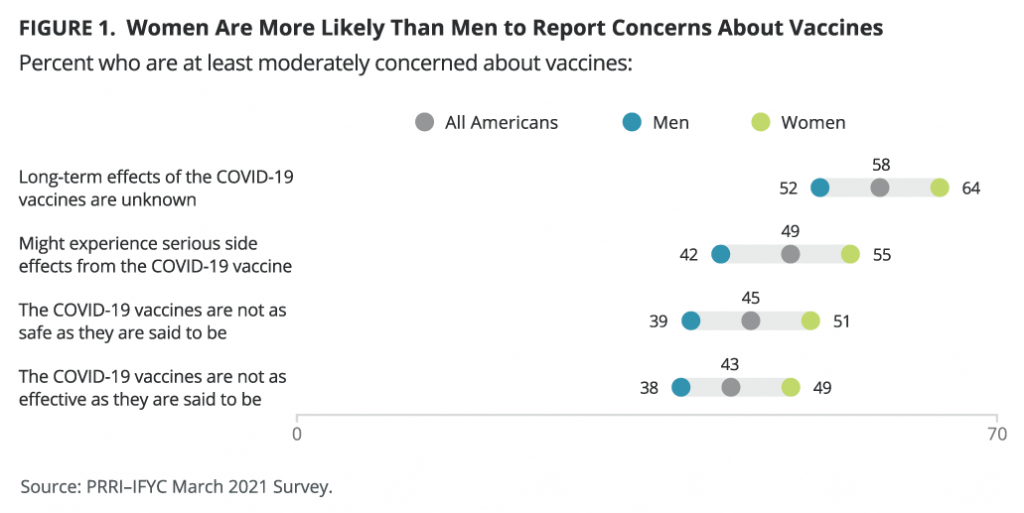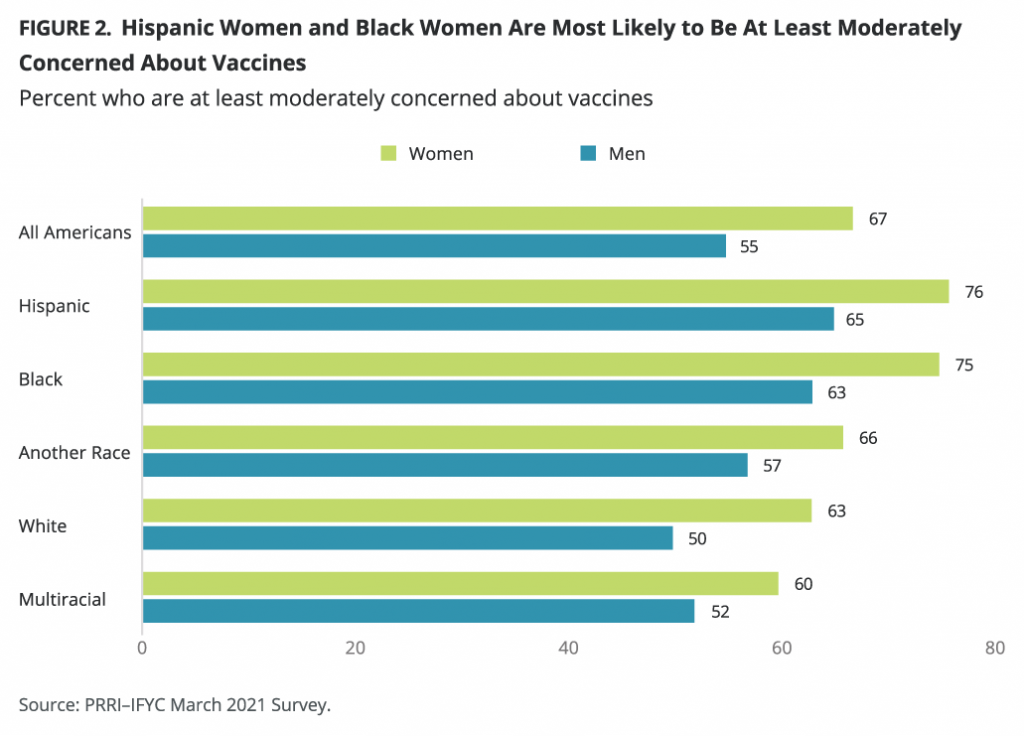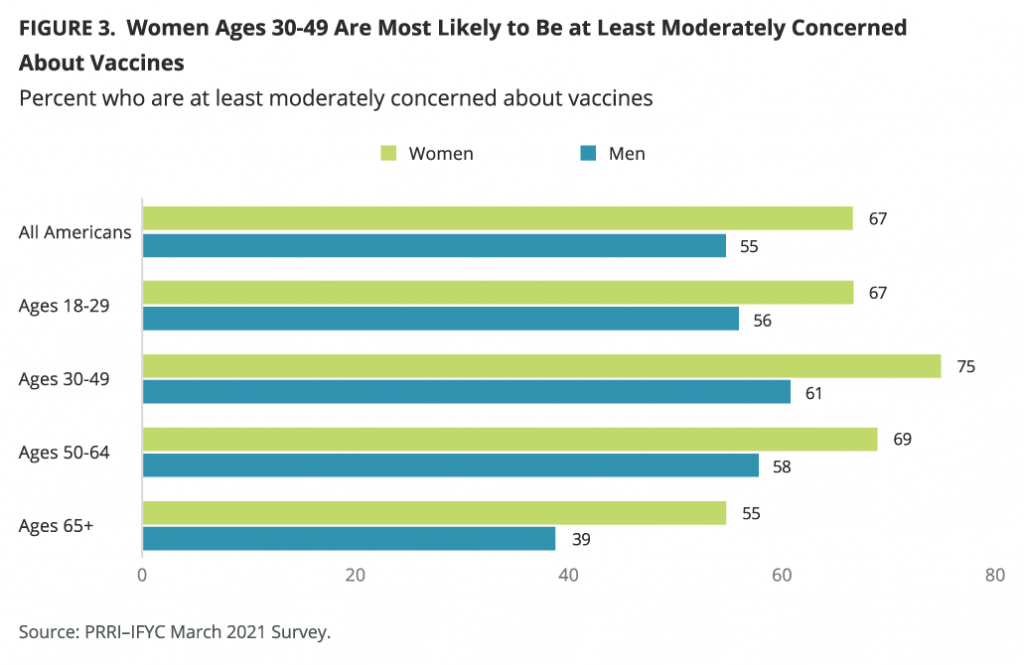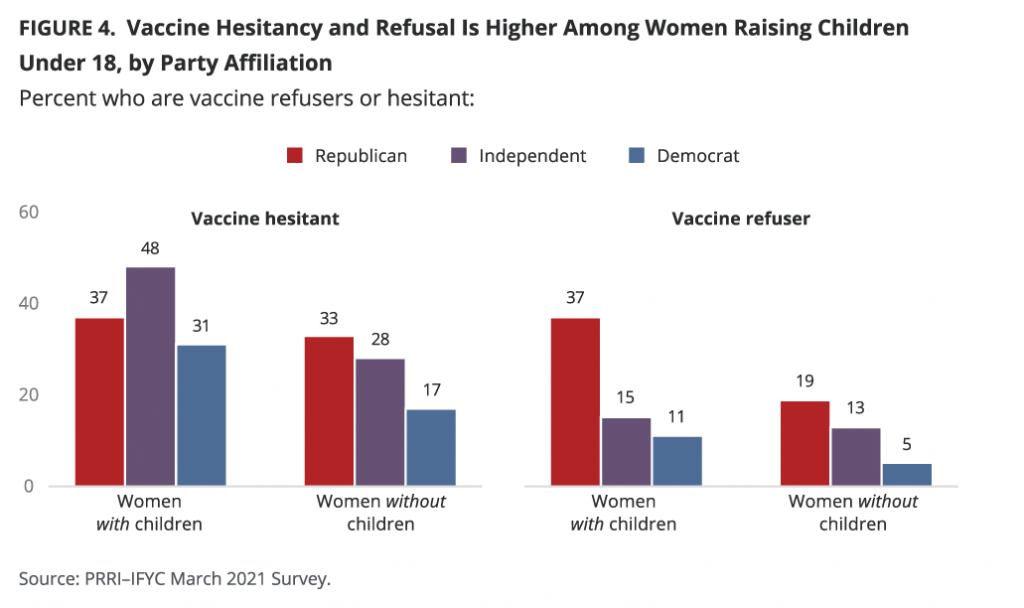Women and Vaccine Attitudes

PRRI–IFYC data shows that women are more likely than men to be worried that the long-term effects of COVID-19 vaccines are unknown (64% vs. 52%), that they will experience serious side effects from the vaccines (55% vs. 42%), that the vaccines are not as safe as they are said to be (51% vs. 39%), or that the vaccines are not as effective as they are said to be (49% vs. 38%). The brief pause on Johnson & Johnson’s COVID-19 vaccine implementation due to a rare blood-clotting disorder developed among some women and reports of women experiencing stronger COVID-19 vaccine side effects make it unsurprising that women are more likely to report having concerns about the vaccines. 
PRRI created a four-point composite index based on the above questions to evaluate overall concerns about COVID-19 vaccines. [1] Using this scale, women are significantly more likely than men to express concerns with COVID-19 vaccines. Two-thirds of women (67%) express at least moderate concerns, including 28% who express major concerns, compared to a majority of men (55%) who express at least moderate concerns, including 19% who express major concerns.[2]
When looking at concerns with the vaccine by race, women are more likely than men to express at least some concerns with the vaccines across every race or ethnicity. Hispanic women (76%) and Black women (75%) are most likely to be at least moderately concerned about the vaccine, followed by women who identify as another race (66%), white women (63%), and multiracial women (60%). Men are less likely than women to be concerned about the vaccines overall, but majorities of men in all racial groups express at least moderate concerns, including Hispanic men (65%), Black men (63%), men who identify as another race (57%), multiracial men (52%), and half of white men (50%).

Concerns about the vaccine among women are also particularly high among those ages 30–49, which may be in part due to misinformation about how vaccines could affect fertility. Three in four women in this age group (75%) express at least moderate concerns, including one-third who express major concerns with the vaccine (34%). Two-thirds of women ages 18–29 (67%) and ages 50–64 (69%) also express at least moderate concerns with the vaccine, compared to senior women ages 65 and over (55%). The data also shows that women raising children under 18 are more likely to have at least moderate concerns about the vaccine than women without children (75% vs. 62%). The gap is even larger between women ages 18–29 with children and those without children (80% vs. 59%).

It is worth noting that concerns about the vaccines are linked to vaccine hesitancy or refusal. Specifically, Americans who are at least moderately concerned about the vaccines are substantially more likely than Americans who have very few or a few concerns with the vaccines to be vaccine hesitant (41% vs. 8%) or vaccine refusers (19% vs. 7%). Among women who have major or moderate concerns, 41% are hesitant and 19% are refusers, compared to only eight percent who are hesitant and seven percent who are refusers among women who have few or very few concerns.
Hispanic women (39%) and Black women (36%) tend to be more vaccine hesitant than white women (27%) or women of other races (26%), while women of other races (9%) and Hispanic women (11%) are the least likely to be vaccine refusers compared to white women (16%) and black women (22%). Multiracial women are about as likely as women overall to be vaccine hesitant (31%) or vaccine refusers (18%).
The data also clearly shows that women raising children under 18 are substantially more likely than women without children to be vaccine hesitant (39% vs. 26%) or refusers (20% vs. 13%). Among young women ages 18–29, this gap is greater. About 45% of young women raising children under 18 are vaccine hesitant, compared to 29% of young women without children. Similarly, about one-third of young women raising children under 18 (32%) are vaccine refusers, compared to 15% of young women without children. All other age categories are not significantly different from one another.
The most surprising findings are related to college-educated women raising children under 18. Even though college-educated women are less likely than women without college degrees to be vaccine hesitant (21% vs. 34%) or refusers (7% vs. 18%), college-educated women raising children under 18 are notably more likely than college-educated women who do not have children to be vaccine hesitant (26% vs. 19%) or vaccine refusers (10% vs. 5%).
When looking at partisanship, Republican women (24%) are more likely than independent women (14%) and Democrat women (7%) to be vaccine refusers, but among Republicans, there are some key differences. Nearly four in ten Republican women raising children under 18 are vaccine refusers (37%), compared to 19% of Republican women who do not have children. Democrat women (21%) are less likely than independent women (35%) and Republican women (34%) to be vaccine hesitant. However, Democrat women raising children under 18 (31%) and independent women raising children under 18 (48%) are substantially more likely to be vaccine hesitant than Democrat women (17%) and independent women without children (28%).

[1] Each question was combined using an additive scale that was then converted into a four-point scale where a score of 1 indicates “major concerns,” 2 indicates “moderate concerns,” 3 indicates “few concerns,” and 4 indicates “very few concerns” about the vaccines.
[2]Around six in ten Americans have either major (23%) or moderate (38%) concerns about COVID-19 vaccines, while about four in ten have either few (32%) or very few (7%) concerns.

